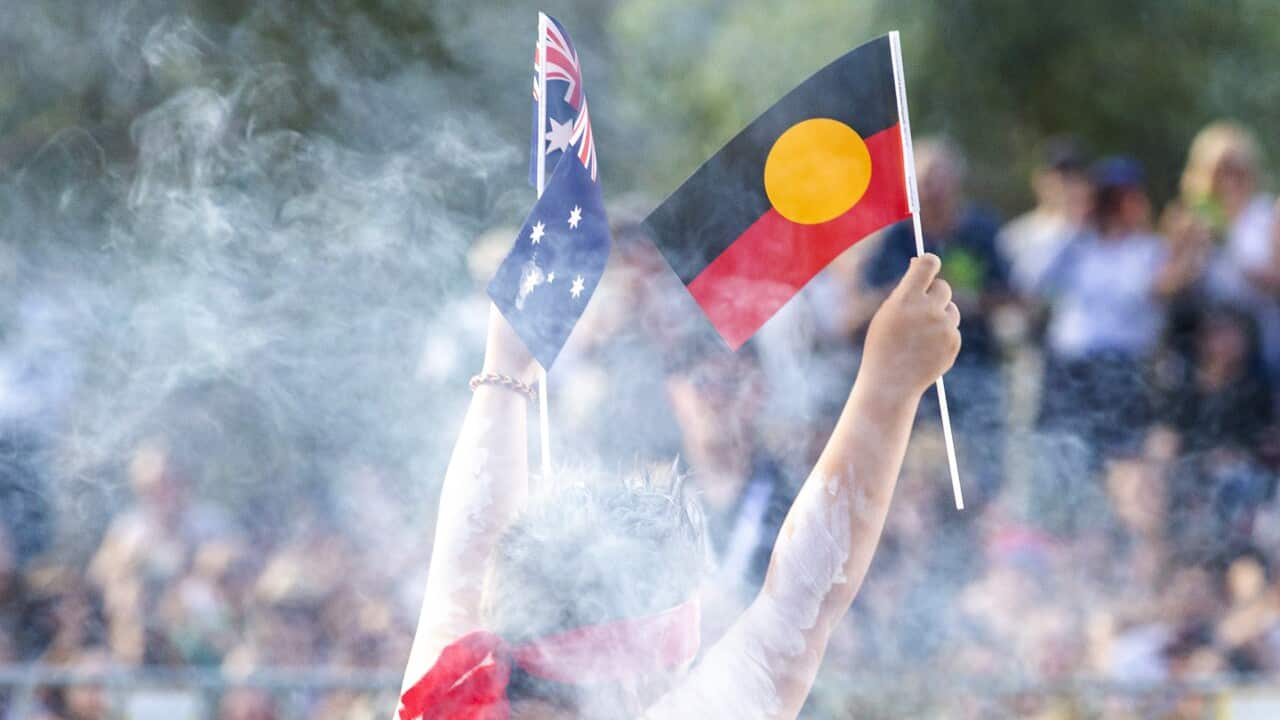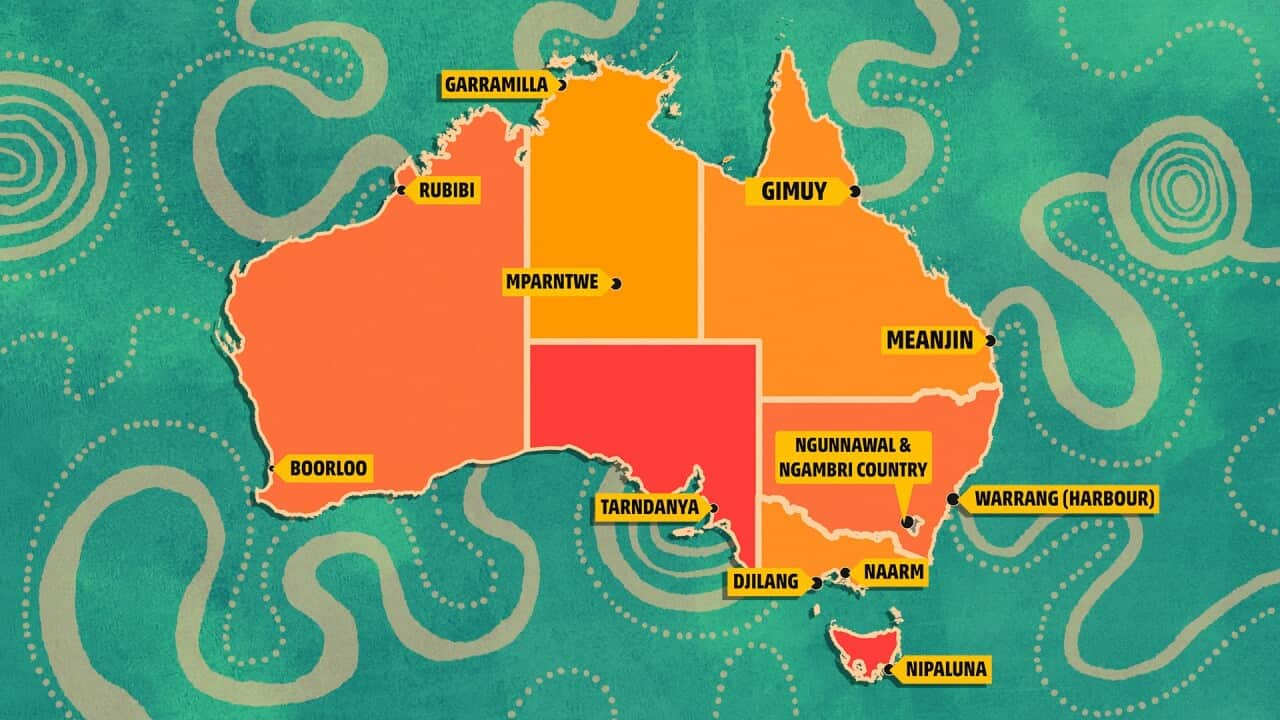

5 min read
Feature
Celebrating, reflecting and mourning: How these three Australians mark January 26
For some January 26 is a day of celebration, for others it’s a day of mourning and protest. SBS Examines shares migrant and First Nations perspectives on Australia Day and asks if there’s a ‘right’ way to mark the date.
Published 23 January 2025 1:38pm
Updated 23 January 2025 2:13pm
By Rachael Knowles
Source: NITV
Warning: Distressing content
Andrew Gai loved Australia Day.
He came to Australia in 2006 after fleeing civil war in South Sudan. He spent four years in Uganda, waiting for refugee status.
There he witnessed the Independence Day celebrations on October 9.
“Ugandans really celebrate their Independence Day. Everyone from school to churches and across the community . . . . everyone would get on the street and march,” he told SBS Examines.
LISTEN TO

Celebrating, reflecting, mourning: Indigenous and migrant perspectives on January 26
SBS English
20/01/202507:56
This made prospect of celebrating his new home on Australia Day so exciting.
"When I came to Australia and became a citizen, it was…something I really took pride in,” he said.
“I was one of those people who would put up the Australian flag on their car and go around celebrating.”
Andrew made a home in Melbourne and began working in community services. He met Aboriginal colleagues and clients and forged friendships with Aboriginal community members.
His understanding of Australia shifted.
Like Australia, many African countries were colonised by western forces. Andrew says it’s a history many migrants have experienced but the continued effect of colonialism is stark in Australia.
“The history of colonisation is very easily understood by people of African background,” he said.
“When you actually come to Australia and see ongoing aspects of that, it makes you realise this is not historical. For the Indigenous community, when you talk about the Stolen Generation, there are ongoing impacts,” he said.
Mourning and myths
Maggie Blanden has never celebrated Australia Day.
For her, it’s a day of mourning and protest.
"We've always been taught as palawa kids that January 26 is not a day of celebration, it's a day of mourning for the loss of our Old People and the colonial violence that continues to be perpetrated against our people,” she said.
“It’s time to come together as a community.”
Every January 26, Maggie and the palawa community march down nipaluna’s Elizabeth Street.
It’s the same path 25 Aboriginal frontier resistance warriors marched in 1825 to call for peace and an end to the killing of their people.
Maggie recalls years where onlookers hurled abuse at those marching. Now, people join.
"We've seen many people start to join us. We have allies walking side by side with us,” she said.
It’s an act of allyship that Maggie says is “so important”.
Colonial forces swept Tasmania with the intent to wipe out Aboriginal people. It’s a period of history termed the ‘Black Line’.
This gave way to the myth of Truganini being the last Tasmanian Aboriginal person.
Maggie says it’s a myth that’s plagued the identity of many palawa people.
“A lot of people need to open up a history book and read about what has happened here,” she said.
"There was an explicit goal on this island, and I would argue nationally, to extinguish the Aboriginal population . . . the colony, really tried to push this myth of Truganini being the last Tasmanian Aboriginal person.”
Maggie says she and her family and community are a rebuttal to this mistruth.
"I resemble what it means to be a Tasmanian Aboriginal person today.”
Colonisation still continuing
Colonisation has impacted both sides of Meena Singh’s family tree.
Her grandfather was born in India but was forcibly sent to Fiji as an indentured labourer for the Commonwealth. Her mother is Yorta Yorta. Her family were dispossessed of their land and forced to live on Cummeragunja Mission on the banks of the Murray River in New South Wales.
She also sees the impact of colonisation in her work as the Victorian Commissioner for Aboriginal Children and Young People.
The Commissioner believes colonialism “isn’t a past thing” and that denying its role in modern issues enables its damage to continue.
“Various things can be true at once. Yes, we're very lucky in this country but . . . we've got a very dark history that is still producing negative outcomes for people, and we need to address that as well,” she said.
She says the Australia Day debate is often ignorant to Aboriginal people’s experiences.
“It’s a really frustrating dialogue because it’s often one that’s conducted without empathy and without feeling what it is that Aboriginal people feel about the date, about the history of this country and what we've experienced,” she said.
“The debate is often about entitlement and about pushing history under the rug.”
Change takes time, and for Andrew, his changes began with connection.
“[Aboriginal people] are very generous and kind, we have a lot of similarities as well. I’ve never called someone an Aunty at work before until now! That’s something I grew up with back home,” he laughed.
“There’s not much education around when it comes to Australian history and our Indigenous people so I strongly encourage people to get out of their comfort zone . . . and get to know Indigenous people and the beautiful culture and the generosity that they have.
“By doing that, we'll be more informed about what the future and days, such as Australia Day, mean to all of us.”




